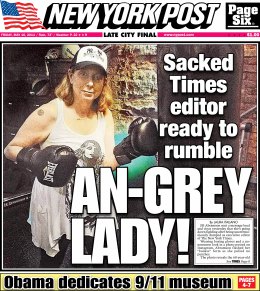After an outpouring of fear “outrage,” the “black mass” planned by the Harvard Extension School Cultural Studies Club was cancelled under pressure.
This terrifying event was promptly held at the Hong Kong in Harvard Square, home of unpalatable Chinese food and drinks with umbrellas in them. Which tells you something about how threatening it truly was.
Drew Faust took a bold stand, of course, calling the group’s sponsorship of the mass “abhorrent.” What a paragon of courage she is.
And various Catholic muckety-mucks got deeply offended, as seems to be their default mechanism.
While paying lip service to free speech, Faust stirred the outrage pot:
The ‘black mass’ had its historical origins as a means of denigrating the Catholic Church; it mocks a deeply sacred event in Catholicism, and is highly offensive to many in the Church and beyond. The decision by a student club to sponsor an enactment of this ritual is abhorrent; it represents a fundamental affront to the values of inclusion, belonging and mutual respect that must define our community. It is deeply regrettable that the organizers of this event, well aware of the offense they are causing so many others, have chosen to proceed with a form of expression that is so flagrantly disrespectful and inflammatory.
That’s laying it on a little thick, isn’t it? I mean, isn’t Harvard secure enough not to get all in a frenzy about a sort of silly exercise of free speech? And what’s really so wrong with it? The Catholic Church has done plenty of offensive things throughout its history, and doesn’t seem to be slowing down. If this black mass was really supposed to be a critique or satire or parody or full-on attack on the Church—so what? I think the Church will survive. Our culture probably needs to spend more time critiquing powerful institutions, not less.
I know nothing about the “black mass” other than what I just read on Wikipedia. I doubt many of the protesters do either. One reason is because there doesn’t seem to be very much to know. There are apparently no reliable written representations of such a mass, and no consensus about what it is. Apparently it’s part of an array of various kinds of masses parodying the Catholic mass which emerged in the Middle Age—others included the “Feat of Fools” and the “Feast of Asses,” which sounds like a reasonably healthy thing to me. If I lived in the Middle Ages, I’d probably want to parody the Catholic mass too. Unless, of course, I was being tortured by the Spanish Inquisition. In which case I would be busy.
Here’s this paragraph from Anton Lavey, who wrote the Satanic Bible, which I guess is the standard for modern-day “satanists,” to the extent that there is such a thing.
The usual assumption is that the Satanic ceremony or service is always called a Black Mass. A Black Mass is not the magical ceremony practiced by Satanists. The Satanist would only employ the use of a Black Mass as a form of psychodrama. Furthermore, a Black Mass does not necessarily imply that the performers of such are Satanists. A Black Mass is essentially a parody on the religious service of the Roman Catholic Church, but can be loosely applied to a satire on any religious ceremony.[10]
A form of psychodrama—that sounds about right. It sounds to me like this was really a kind of performance art (if the student group had called it that, they might not have gotten so much heat). Stupid? Sure. Threatening? Only to the deeply insecure. Offensive? I suppose. So what? Get over it. But if the foremost American practitioner of Satanism calls this thing a “satire,” shouldn’t that be strongly protected by a university president?
Faust announced that during the time the Mass was going on, she would be attending a “Eucharistic Holy Hour” in support of inclusion and mutual respect and our Catholic friends. It’s a classically Faustian bargain—safe, non-controversial, “healing,” but ultimately teaching the lesson that no principle is more important than that of not giving offense—the reductio ad absurdum of a culture in which people are constantly taking offensive.
I wish she would have encouraged people to go to this black mass and pay respectful attention. That teaches a lesson in free speech as well—that in a free marketplace of ideas, the best ones will prevail. If this thing is truly moronic, then the best way to diminish it is to have more people see it. And if not…if there’s something to it-then shouldn’t people see it?
Or is that what Faust is really worried about? Because doesn’t it get a little more complicated if there’s actually a there there?
